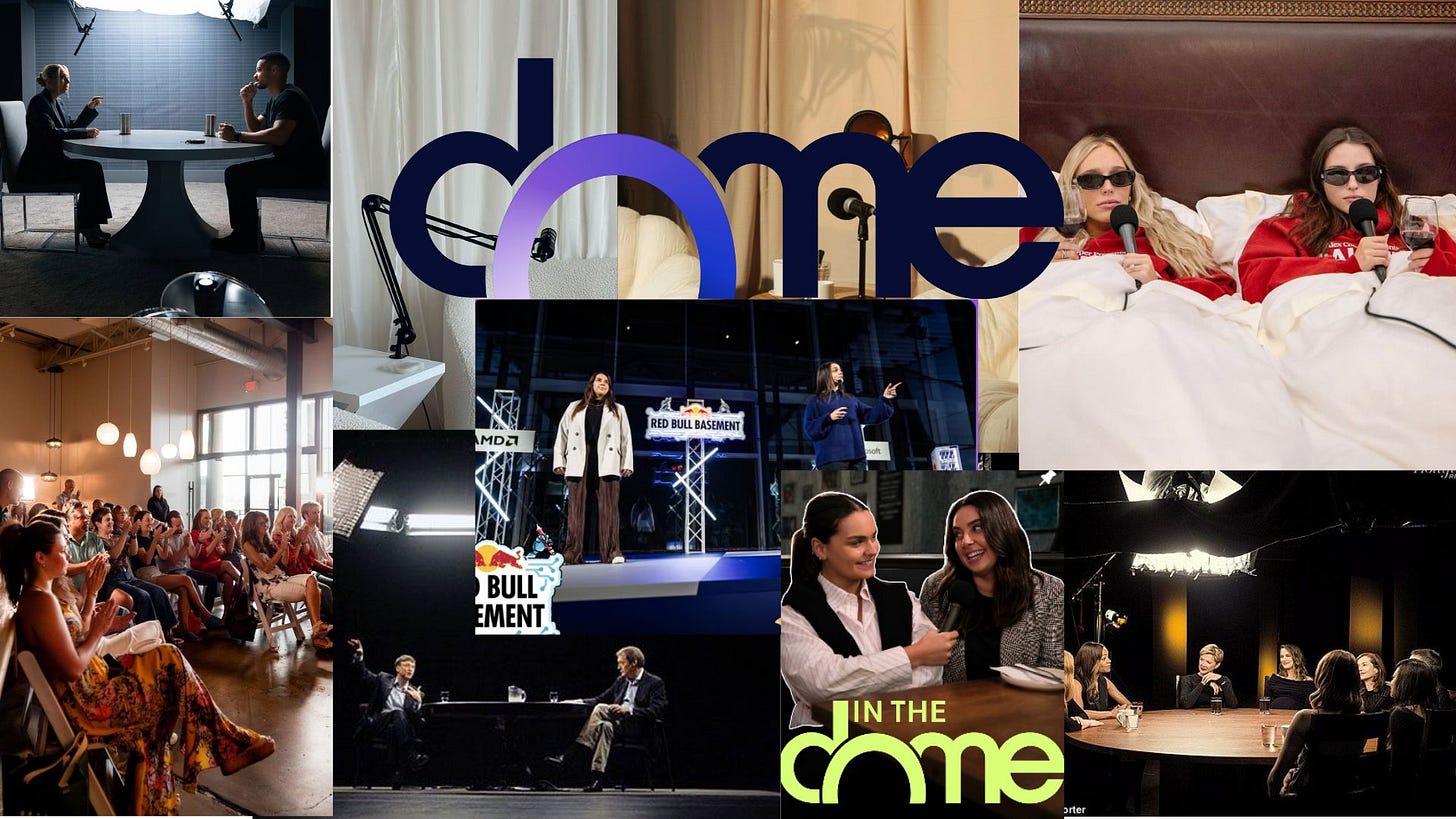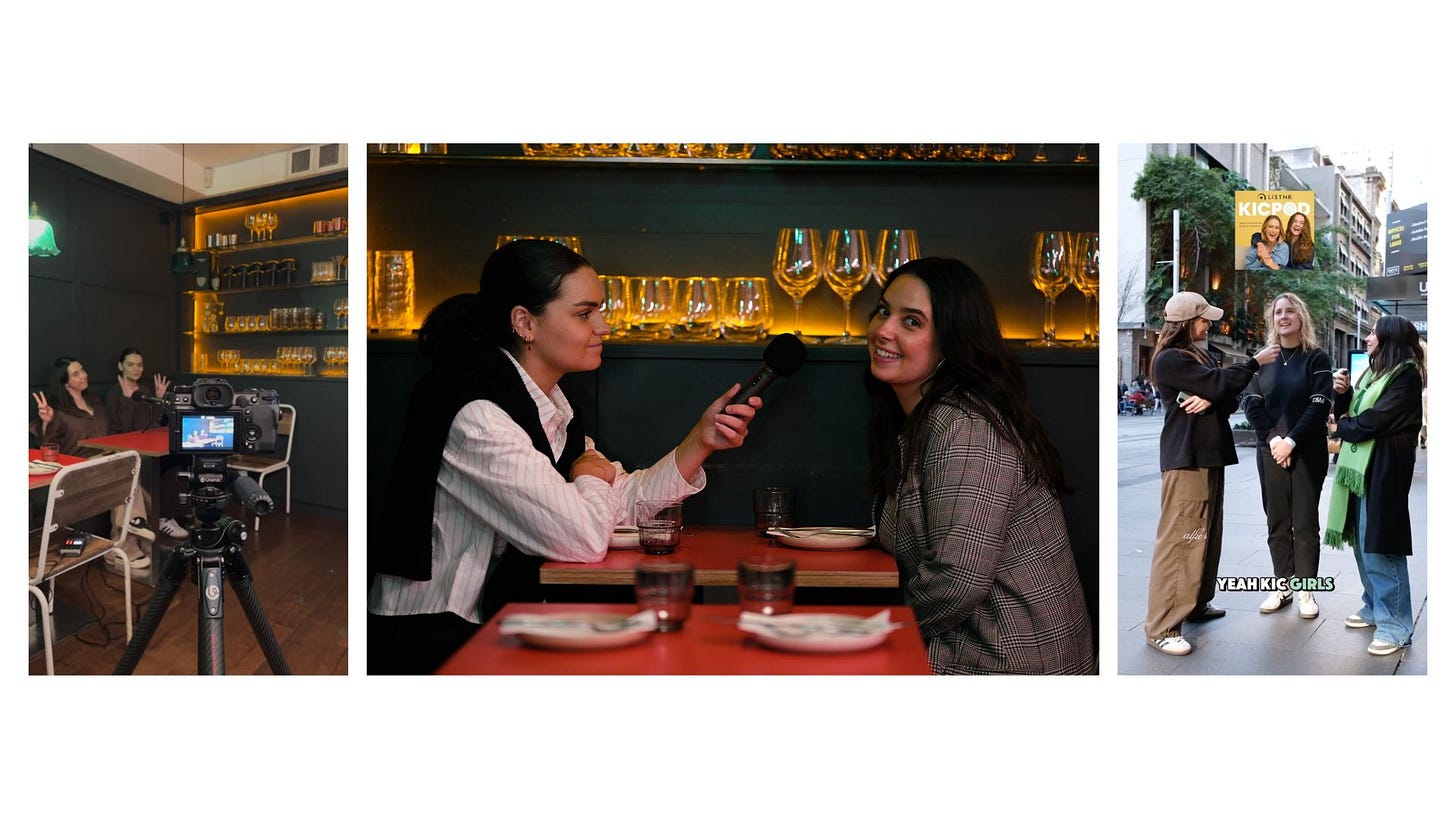From Vibes to Value: The Next Layer of Podcasting
Dome is building the infrastructure that shifts podcasting from downloads and demos to engagement and proof.
Written by Mufaro Mutowembwa
The Quick Take
The Product: Dome is a post-streaming community and analytics platform for podcasts. Listeners gather, conversations are structured, and hosts get sentiment + trend data that powers better content and sponsor alignment.
The Business Model: SaaS analytics for podcasters, brand-side tools and marketplace fees, and an eventual ad platform that disintermediates networks and reduces their 50% take.
The Audience Insight: Dome is designed for niche power - proving that 5,000 right listeners can be more valuable than 500,000 randoms and giving creators the tools to monetise depth over scale.
The Vision: To become the home of podcast communities globally: a platform where intimacy, influence, and investment converge, cutting across software, live experience, and brand marketplace.
The Market
Podcasting is easy to enter, hard to sustain. Anyone can pick up their phone and hit record; very few can hold cultural mindshare week after week. The medium is crowded, but the infrastructure stops at downloads and demos. Dome is betting the real value lies in what happens after the episode ends.
There are more than 5 million podcasts live globally, but only a thin slice generates meaningful revenue. The problem isn’t just uneven quality of content; it’s the lack of infrastructure to translate audience passion into proof of value. Podcasters see downloads, demographics, and drop-off rates. What they don’t see is context: why listeners engage, what themes resonate, and how those signals can be converted into sponsors and scale.
This gap matters because money in podcasting still flows through three channels:
Sponsorships: the dominant revenue stream, but dependent on blunt top-line metrics and networks that can take up to 50% of spend.
Parasocial loyalty: fans build near one-to-one bonds with hosts, but that intimacy rarely gets quantified or monetised.
Live experiences: from global tours to intimate ticketed shows, the fastest-growing frontier.
Today, podcasters navigate this ecosystem with scattered inputs - inbox feedback, messy Discord threads, Patreon comments, call-ins. Networks sell scale but can’t prove depth. The result: inefficiency for brands, missed upside for creators.
Dome’s thesis is simple: community is the underpriced asset in podcasting. Codify it, measure it, and package it into analytics brands can trust and the market shifts from counting downloads to valuing engagement.
The Business
At its core, Dome is building the post-stream operating system for podcasts. Spotify and Apple own the feed; Dome wants to own everything that happens after the episode ends.
The product starts simple: a web app where each show has structured channels for discussion. Listeners onboard through creator CTAs (“join the conversation on Dome”), then interact around episodes, themes, and spin-off threads. That engagement is captured, classified, and analysed - sentiment, trending topics, behavioural patterns.
From there, the roadmap unfolds in three layers:
Community → Analytics
Turn raw conversation into actionable insight. Hosts learn why listeners engage, not just where they drop off.
A GPT-style “co-host” is on the horizon, surfacing episode ideas and sponsor fits from the conversation corpus.
SaaS + Brand Marketplace
Podcasters pay for analytics; brands pay for targeting. Dome’s value is in disintermediating networks: instead of surrendering up to 50% of ad dollars, shows can prove niche value directly to sponsors.
Experiential Wedge
Dome isn’t just betting on software. The founders are also exploring live formats as part of their go-to-market - designed to create cultural cut-through and generate the kind of data that sponsors can’t ignore.
It’s a B2B2C motion. Dome sells to podcasters (B2B), who bring in their listeners (C). Success is contingent on landing a few marquee shows, generating visible case studies, and creating a flywheel where community data begets better content, which begets more loyalty, which begets stronger brand ROI.
What Makes It Special
Most podcast tools stop at the surface: downloads, demos, drop-offs. Dome argues the real value lies in the conversations audiences have after the episode ends. By fusing community with analytics and leading with an experiential wedge, the founders aim to make engagement an investable asset.
Community as data, not just vibes. Conversation becomes a measurable signal: sentiment, trends, themes. The leap from fan chatter to brand-grade analytics.
Experiential GTM. Dome plans to pair product with IRL moments that showcase community at scale - turning launch into both proof and PR.
Brand-grade signals. Proof of ROI beyond promo codes; Dome can show sponsors why listeners care, not just how many tuned in.
Niche power > scale. Five thousand aligned listeners can outperform 500k casuals; Dome is built to prove and monetise that depth.
Disintermediating networks. Networks often take half of sponsor spend. Dome’s marketplace model gives that margin back to creators while giving brands more transparency.
The Founders
Dome is built on complementary skill sets. Bella brings a product, strategy and CX background, with a bias for structured research and assumption-testing. Soph comes from the inside the industry, with a front-row seat to how podcasts and branded content actually operate. Together, they cover strategy and industry insight.
What makes them work isn’t just complementary skills; it’s the way they operate. Every decision anchors back to their mission: community around shared passions. There’s no ego in the room. When the market shifts, they pivot quickly but deliberately, “structured pivots,” as they call them - without losing sight of the North Star.
They’ve also proven themselves as operators who can sell the vision. From securing meetings with heavyweight podcasters to bringing experienced partners on board for an ambitious live play, Soph and Bella have shown they can turn scrappy persistence into high-level buy-in.
Above all, they’re comfortable in ambiguity. They’ll sketch, scrap, and rebuild as needed. What they won’t compromise is alignment: both co-founders hold equal equity, a deliberate choice to avoid power imbalances and keep incentives locked.
The Numbers / Traction
Dome is still early, but the first signals are starting to show.
Team: 4 core members (Soph, Bella, a tech co-founder, and a freelance brand/content strategist).
Product: Web app in development. Build was briefly paused due to tech resourcing; beta relaunch planned for February next year.
Beta Cohort: Targeting ~10 shows for initial founding podcast partners, with focus on niche, highly engaged communities rather than mass reach.
Revenue Model: SaaS subscription for analytics (tiered), brand-side marketplace fees, and optionality for experiential P&L.
Capital: Self-funded to date. No external raise yet; open to creator-investor or strategic capital in the near term.
Investor Lens
Dome’s opportunity sits at the intersection of software, media, and culture. The pitch to investors isn’t just another creator tool it’s a platform play with network effects if executed correctly.
Moat
Data network effects: every conversation logged becomes proprietary insight sentiment graphs, trend maps, sponsor fit data compounding over time.
Switching costs: once a podcaster builds community and sponsor proof inside Dome, leaving means losing their structured engagement history.
Experiential IP: Dome’s push into live formats can become defensible cultural real estate, driving both distribution and data capture.
Scale
SaaS ARPU x #shows: : recurring revenue from podcasters paying for analytics (a classic SaaS model - average subscription price × number of shows), plus brand fees and optional events P&L.
Brand fees: monetisation via marketplace connections between sponsors and podcasters.
Events optionality: Events optionality: live formats as both marketing flywheel and potential standalone P&L line.
Risks
Adoption dependency: requires convincing podcasters to onboard their audiences: a B2B2C friction point.
Moderation overhead: structured community still carries risk of toxicity, harassment, or brand safety breaches.
Analytics accuracy: must avoid “fluffy” insights; sponsor trust depends on rigorous attribution.
Catalysts
Signing 10–20 mid-niche shows with highly engaged audiences.
First case study showing Dome analytics → sponsor campaign with verified lift.
Shipping v1 of the AI “co-host” tool, proving value beyond community management.
A high-profile live play with brand backing could position Dome not just as a SaaS startup, but as a cultural operator.
Exit Potential
Dome operates in the overlap of podcasting, the creator economy, and adtech - markets where incumbents have scale but struggle to translate cultural depth into product. Likely buyers include:
Spotify / Audible / SiriusXM: to bolt on a community + analytics layer that deepens engagement and improves monetisation beyond downloads.
Patreon / Discord / Reddit: each strong in community, but none purpose-built for podcasts; Dome could give them a verticalised edge.
Live Nation / Endeavor / TEG: Dome’s exploration of live formats shows podcasts can operate as IP beyond audio. An events player could acquire Dome for the data + community funnel into their existing live portfolio.
Steven Bartlett’s Flight Studio: An emerging media empire built around Diary of a CEO, Flight Studio has shown its ability to scale podcast IP into arenas, book sales, and brand partnerships. Acquiring Dome could give Flight Studio the infrastructure to formalise and monetise the community flywheel it’s already proven, while adding data-driven credibility to Bartlett’s vision of creator-led media.
Adtech / Martech platforms: from The Trade Desk to niche sponsorship marketplaces, Dome’s structured audience data is the missing link between podcast ad spend and measurable ROI.
In a best-case scenario, Dome evolves into a marketplace at scale - the bridge between niche podcast communities and brand dollars. That positioning would command a premium multiple, especially in a landscape where CAC pressure is pushing advertisers to seek intimacy over impressions.
TIC Insight - Would I Invest?
When I first heard about Dome, I found myself talking it up before I’d even met the founders. The reason is simple: podcasts already function as community hubs. From The Girls Bathroom’s international tour to Diary of a CEO’s arena shows to Acquired’s cult following in the business community, the proof is everywhere - podcasts create loyalty that rivals subcultures. Building infrastructure on top of that is a sharp bet.
Meeting Soph and Bella only reinforced the thesis. As a duo they balance product clarity with media fluency, and they operate with the kind of energy and focus you want to see at this stage. I back the idea, and I back them.
Execution is still the hinge. The conditional yes rests on three milestones:
Land 10–20 founding podcast partners: creators with loyal audiences who can demonstrate Dome’s model in action.
Produce a sponsor case study: data that shows Dome improving ROI, moving it from community app to measurable adtech platform.
Ship a v1 AI co-host: not a gimmick, but a working tool that surfaces episode ideas and brand fits from audience conversation.
If those boxes are ticked, Dome moves from product to infrastructure. And infrastructure - in media and culture - is where real value compounds.
Podcasting has always thrived on intimacy the sense that you’re in the room, part of the conversation. Dome’s bet is that intimacy can be structured, measured, and scaled without losing its edge. If they’re right, they won’t just build another tool; they’ll redraw the economics of the medium. From comments to signals, from vibes to value, Dome is chasing the kind of cultural infrastructure that turns audiences into assets and that’s a play worth watching.





Fantastic article! One of the best ideas on IRL communities in a longggg time
Hi! How can we get deal flow to invest in Dome?